8 Black Hair Pros Who Elevate Hairstyling to a Fine Art
Hair and Black identity have always been closely intertwined. From a young age, the most defining adolescent memories of many Black children — myself included — can be linked back to days at the salon or getting your hair washed in the kitchen sink. Throughout the history of colonialism, and as Western cultures promoted white-washed beauty ideals, altering Afro-textures as a form of assimilation and means of societal survival was the status quo.
But in recent generations, that's begun to shift, with important work being done to strip away the negative stereotypes around Black hair and provide room for the Black community to stay true to their heritage, unapologetically. Embracing natural hair goes beyond superficiality; it is freedom, defiance and pride all at once. And considering it is an avenue of self-expression, hairstyling can also be a form of art.
That view is fundamental to how many professional hairstylists approach their work. While Hollywood and fashion are notorious for failing to hire Black hairstylists and underserving the needs of Black actors on set, a cohort of hair professionals — whose work can be found on red carpets, magazine covers, ad campaigns and runways the world over — are bringing their artistic visions to life through hair. They're well-versed in working across all hair textures, delivering boundary-shifting sculptural updos, statement-making braided styles and surrealist curls that amplify the beauty of Black hair to new realms.
Their work is a celebration of Blackness, of culture, tradition and of the versatility of natural hair textures. It's a flat-out rejection of the narrow-minded beauty ideals that defined those magazine covers and ad campaigns for too long. It's artistic expression, in hair form. But these hair artists also show that Black hair doesn't have to be woven into intricate, artful updos or elaborate braids to be beautiful or meaningful. A simple ponytail or twist-out can be just as impactful, particularly in their expert hands.
Ahead, get to know eight Black hairstylists who are elevating their craft to a fine art form. (Seriously, who do we have to speak to about putting their work in a museum?)
Christina Rendall
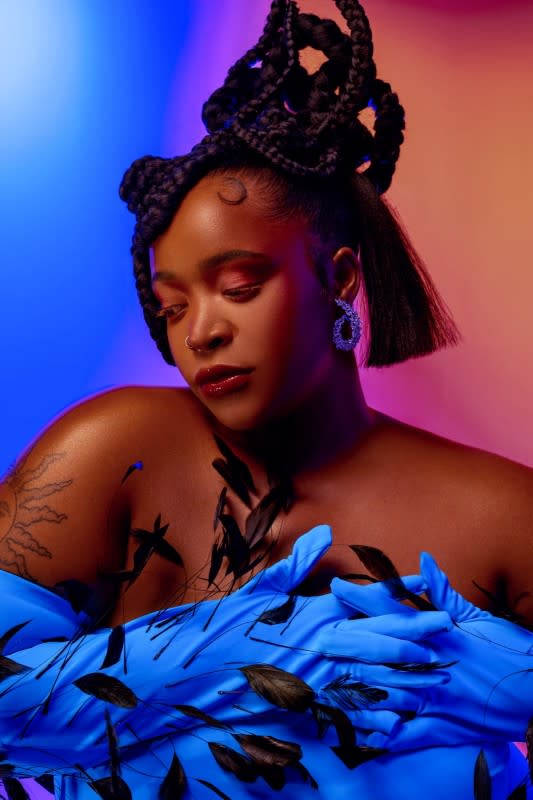
Hair by Rendall.
Photo: Yolanda Hoskey/Courtesy of Christina Rendall
View the 4 images of this gallery on the original article
Growing up in Brooklyn, New York, where sporting the hottest fashion and trendiest hairstyles is the name of the game, Christina Rendall recalls that her mother, who had immigrated from Cape Verde, "was not doing that," she laughs. So, around the age of nine or 10, when she'd "had enough of the choo choo train track braids with the ribbons in it," she ventured out to the local beauty shop herself. "I was like, 'I'm going to the hair store. I'm getting me some barrettes and some bobos, and I'm going to spice this thing up myself, because you're playing with me.'"
Eventually, word got around that Rendall had a way with hair, and she started making money as a stylist for her classmates and neighbors. Years later, Rendall attended cosmetology school, which she recalls as "one of the best times of my life," explaining, "It was the first time for me that I saw myself — other than [in] science or math — shine [academically]," she says.
Now, as the founder of hair company House of Crown and with a roster of celebrity clients that includes Jari Jones and Brandee Evans, Rendall's "approach to creating revolves around women and their stories," she says.
"[Women] really inspire me," she continues. "And how I go into [creating] is hearing their stories or their roles that they're playing that are huge, whether it's their [professional] roles or their individual lives."
Her hope for the future? That there's even more awareness and education surrounding Black hair, along with widespread acknowledgment of the beauty of simpler hairstyles.
"I think a lot of people know how to do simple things with other textures of hair, but when it comes to our hair, it is like we have to do the glitz and glam for it to be beautiful — and we don't," she expresses. "Sometimes [all it takes is] a nice braid or a ponytail, all of these things are beautiful. That's elegant as well."
Lacy Redway
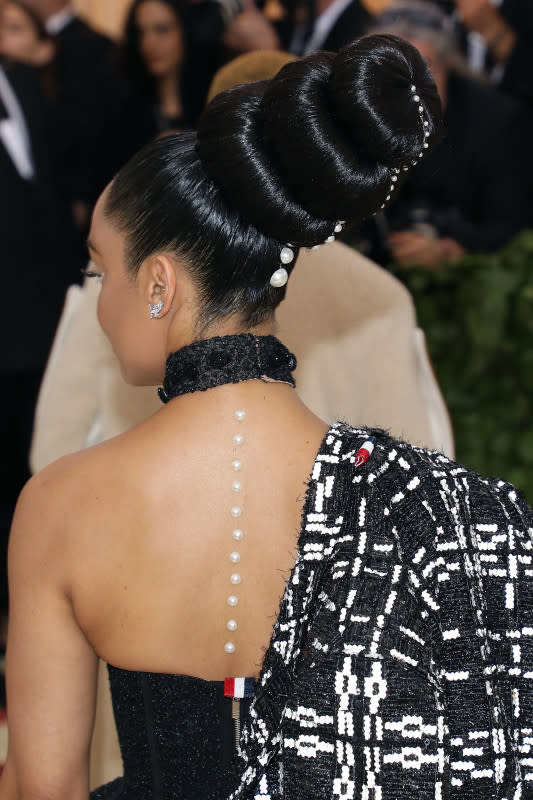
Tessa Thompson at the 2018 Met Gala, wearing a look by Redway
Photo: Taylor Hill/Getty Images
View the 7 images of this gallery on the original article
With clients including Sheryl Lee Ralph, Laura Harrier, Teyana Taylor and Florence Pugh, and as a current brand ambassador for Unilever hair, Lacy Redway has done more than solidify herself as a top name in the industry. Her work — be it Harrier's simple, sleek bobs or Tessa Thompson's tiered updo at the 2018 Met Gala — are conversation starters in their own right. And yet, growing up as a Jamaican immigrant, Redway wanted to do anything but stand out.
"When I came [to America as an immigrant], my mom had someone put a chemical relaxer in my hair, and it broke my hair off," she tells Fashionista. That inspired Redway to take things into her own hands. "I didn't really want to stand out. You didn't realize that being different was cool and important. You wanted to just blend in…Then I also realized that I could braid hair, and I started offering the service at school at the young age of 11 in middle school to braid other children's hair."
She continued perfecting her craft by working in a hair salon in high school, conducting photo shoots to build her portfolio and assisting nearly all the major hairstylists in fashion, including Guido Palau, Eugene Souleiman, Odile Gilbert and Luigi Murenu. Today, Redway is herself among those top names, most recently working as the key hairstylist for Christian Siriano and LaQuan Smith at New York Fashion Week Fall 2024.
When it comes to artistry with Black hair, Redway hopes to showcase "the ability of what our hair can actually do," she explains. "There's a lot of misconception around Black hair, specifically from those that don't understand our texture, that don't realize how malleable it can be…Coming up in the industry and now, being a lead stylist backstage, I've heard so many horror stories from models that say people are intimidated by their hair, that they won't even touch it on photo shoots or when they're backstage. So I like to continue to show our hair texture on platforms that we're not typically accepted and to celebrate as much as possible."
At the same time, Redway emphasizes the importance of not being pigeonholed.
"While I still love to create fantasy hairstyles, I like to give real inspiration to real people of what they can do to change their overall look or appearance if they choose to," she says. "I'm not only a stylist who does Black hair, I do all hair types and textures. That has been really important to me in just having this conversation in the industry to make sure that as a Black woman, I'm not [seen as] just a Black woman hairstylist — I'm a great hairstylist."
Fesa Nu
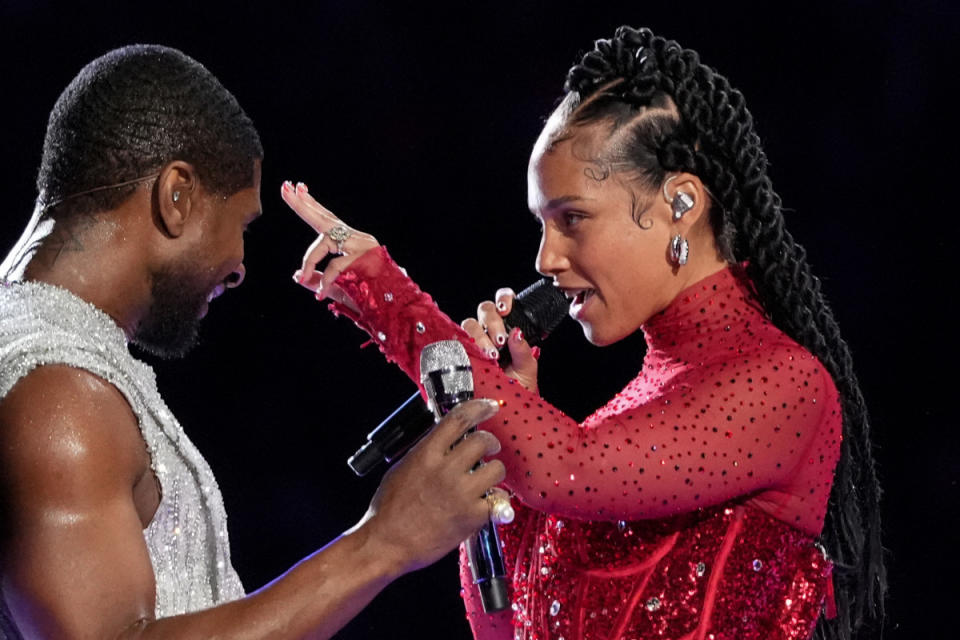
Alicia Keys performing with Usher at the 2024 Super Bowl, wearing a look by Nu
Photo: Timothy A. Clary/AFP/Getty Images
View the 4 images of this gallery on the original article
"I want people to feel a sense of poetry when they look at my work," says self-proclaimed "hair poet" Fesa Nu. "I want them to be moved and feel inspired and motivated." She embraced this love for hair at a young age, charging $10 to braid hair at school.
"I knew I had a gift but I didn't realize I really wanted to make it a career until I traveled home to South Africa for the first time in 2013," she says. "I became so inspired by all the art, hair and history. At that point, I knew I had to tap into my love for hair and passion for creativity."
Said passion comes to life with every hair look Nu takes on, from otherworldly editorials to versatile hairstyles for celebrity clients — including Chloe Bailey and Alicia Keys. (She styled the latter's hair for her appearance during this year's Super Bowl halftime show.) When it comes to creating sculptural hair looks, Nu prefers to "let things flow," versus having a meticulous plan.
"Celebrating Black hair to me means the feeling you get after listening to a beautiful orchestra or a powerful poet," she says. "The goosebumps you get after that feeling of seeing or hearing something powerful."
The hair space is diversifying quickly, and Nu wholly embraces the future to come: "There are no bounds to Black hair because it defines art to me," she says.
Vernon François
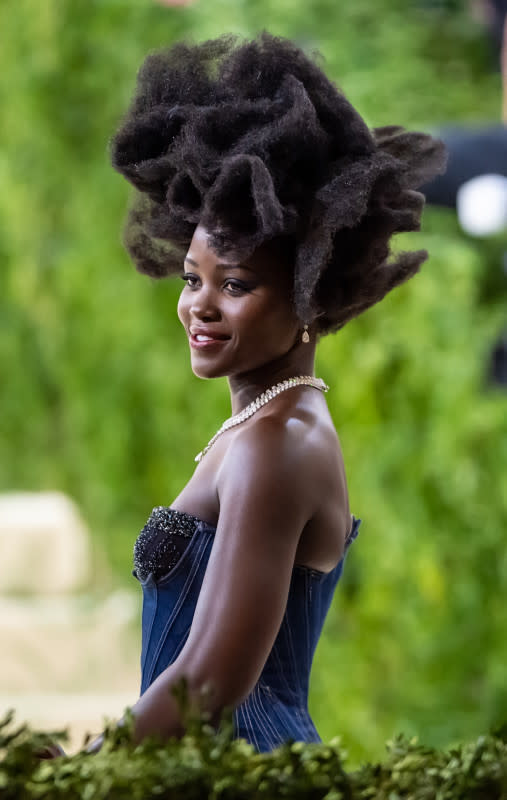
Lupita Nyong'o at the 2021 Met Gala, wearing a look by François
Photo: Gilbert Carrasquillo/Getty Images
View the 8 images of this gallery on the original article
A single step into a hair salon at the age of 14 was all it took for Vernon François to know he'd flourish in that space.
"Growing up in a Rastafarian family in northern England, most of my earliest memories are rooted in hair," he recalls. "Caring for hair, experimenting, exploring, obsessively figuring out how [to] create beautiful braids, painlessly. Rushing home from school to practice on the doll's head, Chaniqua, who was secretly kept under my bed, practicing on friends in the playground, installing my brother's first set of locs — hair is the foundation of so many happy early childhood memories."
As the founder of his eponymous hair-care line and an expert who works with a full spectrum of hair textures, there's only one rule François abides by when creating his boundary-shifting hair looks: Don't limit yourself to rules.
This approach to hair is ever-present across his portfolio: On the covers of Cosmopolitan, L'Officiel USA, Vogue, Teen Vogue, Allure and Essence; and on the likes of Serena Williams, Natasha Lyonne, Willow Smith, Laura Harrier, Amandla Stenberg, Solange Knowles, Angela Bassett and Lil Nas X. François is also behind many of Lupita Nyong'o's headline-making looks, from her sculptural waves at the 2021 Met Gala to her mesmerizing beehive-esque loc bun at the 2022 Oscars.
"It's about embracing individuality and not being confined by trends," he says. "Every head of hair is like a canvas to me, and one of my favorite things is showing off just how versatile Afro, coily and curly hair can be — with shapes that defy gravity, embrace volume, take intricate or mind-blowing forms, are adorned with embellishments and so on. I'm like a kid in a candy store every time."
His work encompasses more than giving clients a new look, but is also about "helping them to connect with their identity [and] empowering individuals to feel beautiful and confident from the inside out."
Charlotte Mensah
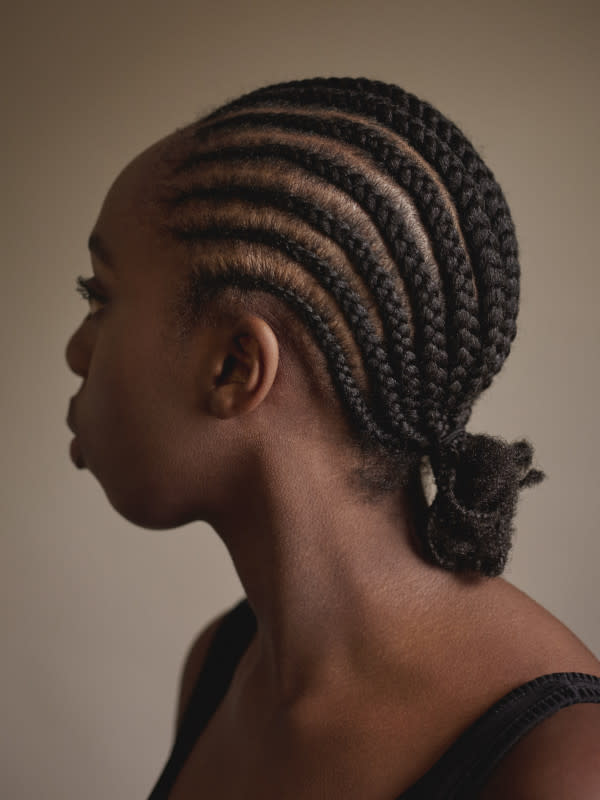
Hair by Mensah
Photo: Courtesy of Charlotte Mensah
View the 8 images of this gallery on the original article
In the words of Charlotte Mensah, hairstyling "is a craft."
"Beyond putting my 10,000 hours [of time, research and practice] in, it requires a deep reverence for all arts and craft forms," she says. "There's also an element of not being tied to an outcome. I've had to be somewhat fluid in response to the experimental way in which we try things. The goal is always to push the boundaries of what's been done, by paying dues to what's come before. A forever task."
Growing up in Accra, Ghana, the British Hairdressing Hall of Face inductee and three-time Afro Hairdresser of the Year award-winning hair artist references her culture and broader African culture. No matter the texture, "natural hair styling is key," she says. "It's both therapeutic and innate to the human condition."
Beyond running her hair-care line Charlotte Mensah Manketti, Mensah has worked with stars including Indya Moore and Tessa Thompson. In 2022, while Tracee Ellis Ross was promoting the launch of her brand Pattern Beauty in the UK, Mensah was the creative mind behind Ross's sculptural braided updo. Her designs are rooted in an important pillar, one that's a "core value" in everything she's done: quality.
"Opening a hair salon, winning British Hairdresser of the year three times — quality has been at the center," she says. "That's my brand; and the product range is now part of that. Quality of everything. On top of that, I love to create accessible and wearable, high-quality, editorial-worthy hair. It's incredibly rewarding when people trust your vision and creative abilities."
Agnes Ashi
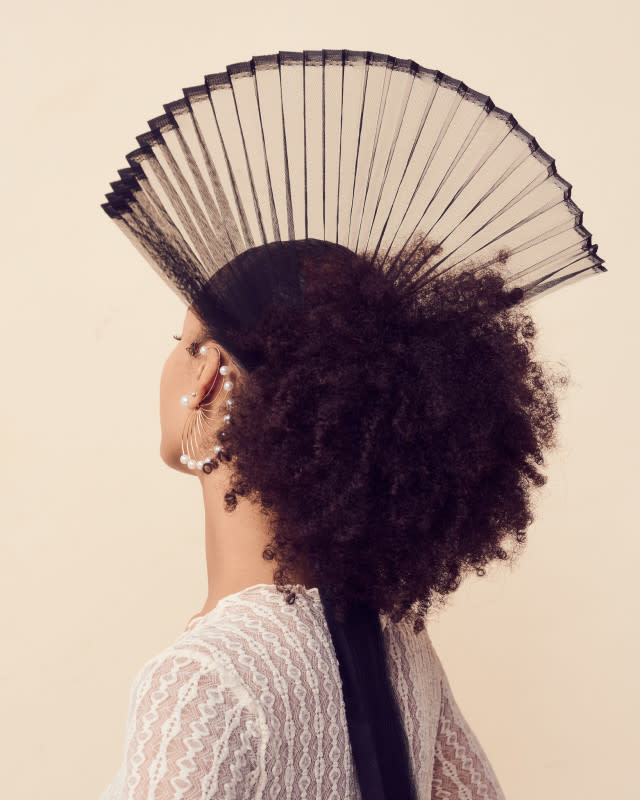
Hair by Ashi
Photo: Nayo A/Courtesy of Agnes Ashi
View the 6 images of this gallery on the original article
Despite having a mother who changed her hairstyle every week and an aunt who owned a beauty salon, it wasn't until after Agnes Ashi graduated college (with a degree in biology) that she decided to pursue a career in hair. But the interest was always there as she learned to braid at her aunt's salon in her youth. Elevated braiding techniques are a signature of hers today, as seen in the many editorials she's worked on, as well as celebrities such as Marsai Martin and Amanda Gorman.
Her career path can partly be attributed to an art history class she took during her senior year of college, where she became obsessed with the painter Kehinde Wiley.
"I really love how he portrayed Blackness," Ashi says. "And so with me already knowing how to do hair and me doing hair for all of my friends my whole life, I found that hair was my art [and] my way to express how I felt when I looked at Kehinde Wiley's work."
No matter the project or the client, Ashi aims for every hairstyle "to fit like a crown," she says. "I look at my canvas and the features of the model or the client and I create something specifically for them, for their hair and their features and everything," she continues. "They are an active part of the creative process."
She also draws a lot of inspiration from "different African cultures and the importance that hair holds in those specific cultures." Ashi hopes the future of hair "looks like way more space for Black hair to exist more freely and more authentically."
Jawara
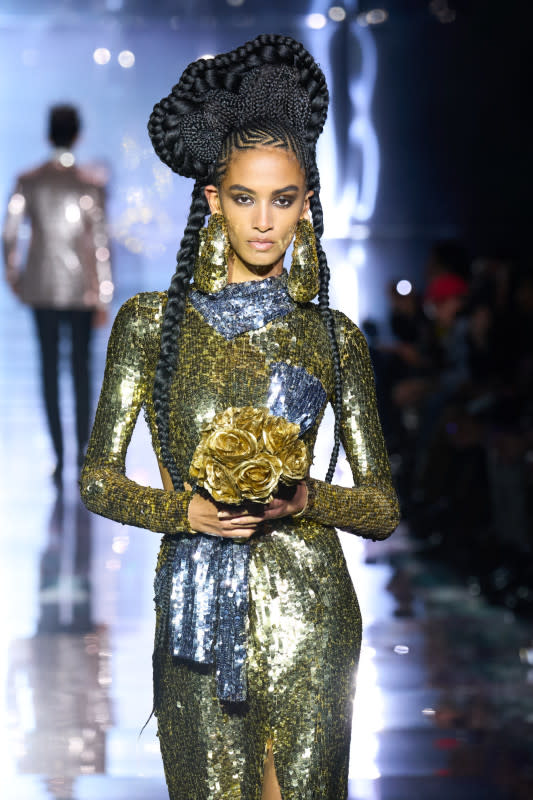
Tom Ford Spring 2023, with hair keyed by Jawara
Photo: Launchmetrics Spotlight
View the 7 images of this gallery on the original article
This year alone, Jawara Wauchope — known simply as Jawara — served as the lead hairstylist for Saint Laurent's Spring 2024 campaign featuring Diana Ross, collaborated with Beyoncé for her CR Fashion Book cover, keyed the hair for Altuzarra's Fall 2024 show and led the hair team for the Jacquemus x Nike campaign starring Sha'Carri Richardson and her 16-foot braids.
His work can also be found in campaigns for Loewe, Marc Jacobs, Versace, Burberry and Dior, as well as on the runways of Prabal Gurung, Tom Ford, Off-White, Theophilio and Brandon Maxwell. In 2020, it was even featured in a London art exhibit titled "Tallawah," featuring photographs of Jawara's styles shot by photographer Nadine Ijewere. Artistry is a common thread in Jawara's extensive portfolio.
As he shared in a previous interview with Fashionista, he began at the age of six: "It started off just me helping [my aunt] and I caught on really quickly. I loved seeing the ways people expressed themselves in that culture through hair, elaborate hairstyles and elaborate hair colors."
The Jamaican-American hairstylist, who has also worked with Solange Knowles, Bella Hadid, Rihanna and Anok Yai, cites his Jamaican culture and New York perspective as pillars of his hair philosophy.
"I hope that my work can also make people feel like hairstyles that were looked down upon or ridiculed and deemed unconventional by whichever group — I like to highlight that and show that that's art, too," he says
Helena Koudou
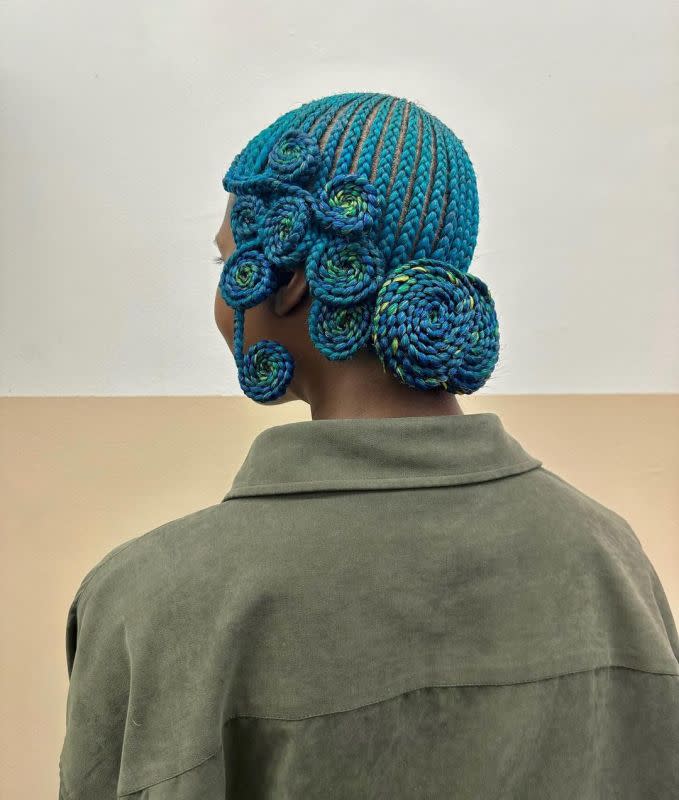
Hair by Koudou
Photo: Courtesy of Helena Koudou
View the 6 images of this gallery on the original article
Helena Koudou's hair journey started like that of many beauty professionals: playing with her dolls' hair as a toddler. She spent her remaining adolescent years perfecting her craft and, at 16 years old, her aunt invited her to work in her salon.
"When I first combined working on photoshoots with other creatives and hair braiding, that's when I knew I wanted to pursue it as a career because I never knew that you could take it outside of a salon," Koudou tells Fashionista.
Her braids are elaborate, intricate and full of unique patterns, such as braided finger waves, stacked updos, freestyle cornrows and endless iterations of Koroba braids. It's no wonder that her looks have been spotted on the likes of Amandla Stenberg and Jacques Agbobly.
Her biggest points of inspiration hail from traditional African hairstyles, such as "life-Fulani braids from the Fulani tribe, swirl braids from Madagascar, or the Koroba hairstyle from Yoruba culture," she says.
"I look at hair braiding as art. The comb is my pencil, and my client's hair is my drawing board," Koudou explains. "I'm always mindful of how the hairstyle will shape my clients' faces, and I always make sure they are loving what they see during the process. Braiding hair is a beautiful art process to me because it starts off with an idea and ends with a beautiful outcome. Sometimes I have no idea where my mind and hand will take me, but I always trust the process."
For her, Black hair "has always been the blueprint," and she's especially excited to see more braids on the runway.
"I think that the future of Black hair will always progress in beauty," she adds. "The braids that've been trending for the past 10 years are styles that our ancestors wore. They say that history repeats itself, so it's no coincidence that braids like 'Koroba' are trending."
Never miss the latest fashion industry news. Sign up for the Fashionista daily newsletter.

